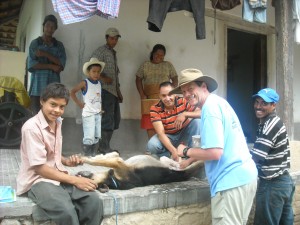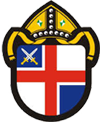A Vet Reports on Medical Brigades in Honduras
By:Â Jon Nash
I have now been involved in five medical brigades in Honduras as a small animal veterinarian. The reward for helping these people with so few medical resources is HUGE. Our brigades usually consist of medical doctors, pediatricians, nurses, physician assistants, dentists, veterinarians, and interpreters. The people of Honduras are so grateful for someone who cares to listen to their problems and is willing to help. They are also grateful for the medications dispensed and the general hygiene advice given.
A medical mission can be an expensive endeavor so fund-raising early is important. For a week-long mission, expect around $1000 for airfare and lodging (at least where we stay), more money for rental cars and gas (amount depends on vehicle and how many people are in it, and $10,000 to $15,000 for medications, vitamins, shampoos, toothbrushes, etc. Often your breakfast and supper are included in the lodging. We take peanut butter and jelly with us for our lunches (you can’t find peanut butter in Honduras). We have found that it is less expensive and much easier to buy most of the pharmaceuticals from a pharmacy in Honduras than it is to try to take it in. Airlines charge more for the bags and customs in Honduras will want permits for most of the supplies. The doctors need to be ready to practice good medicine with very limited resources and without the latest drugs to hit the market. When operating on donations, generics go much further. You will not have access to X-ray, CTs, MRI’s, Ultrasound, blood work, etc. Severe cases can be sent to the bigger cities for care.
The nights are spent preparing for the next day. We get together “bags†to pass out to the people we see in the villages. In the “bags†we will have over the counter medicines that we take for granted as well as vitamins and shampoos. Acetaminophen and/or Ibuprofen, multi-vitamins, anti-diarrhea meds, antacids, etc. are packaged, labeled, and put into bags to pass out to families. Prescription drugs are dispensed as prescribed. We have found the locals love to help put the “bags†together and will make this process much faster. Let them help for you and for their own pride. The days consist of driving to a village, setting up in the village school, and seeing people. They will come from all around, some walking for hours to be seen. They are a very patient people so waiting to be seen is not an issue. Their smiles are your reward . . . especially the smiles of the children. The dentists will spend their days pulling teeth, lots of teeth. The diet of the Hondurans is not a good one. They eat a lot of mangoes that are very sweet and acidic. They also love their soft drinks.
The veterinarians operate differently from the MD’s. The large animal vet team will go to a centrally located corral and work the large animals there as they are herded there. It is interesting to watch the herds go down the middle of the roads. The small animal team will set up on the tailgate of a pick-up truck in the shade nearby. The veterinary team focuses on preventive medicine giving vaccines, dewormers, vitamins and external parasite control. When needed, some treatment is given for illness and some surgeries are performed, mostly neuters. The veterinary team can usually make it to 2 villages a day while the human team usually hits one village a day.
Every mission to Honduras is a learning experience. We learn more about their culture, we figure out more about their needs, and we plan on the changes that we need to make for the following year to make the mission even better. Plan on going the next year because you will want to go back!





